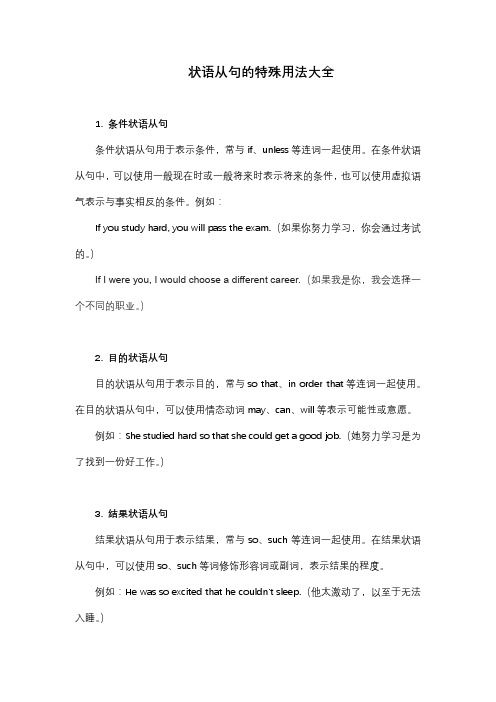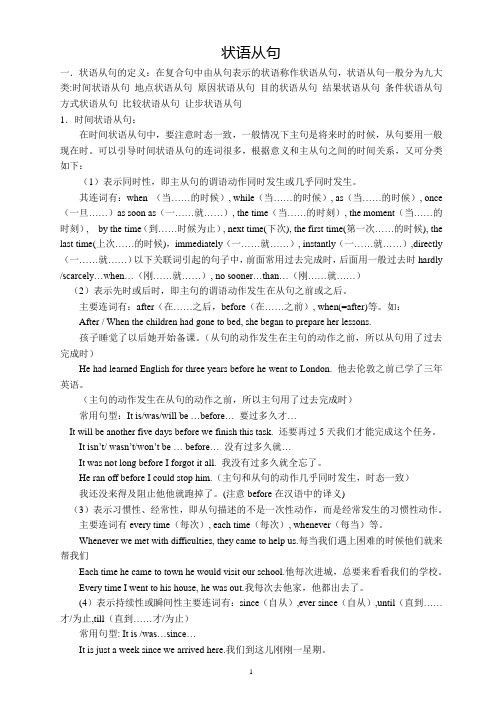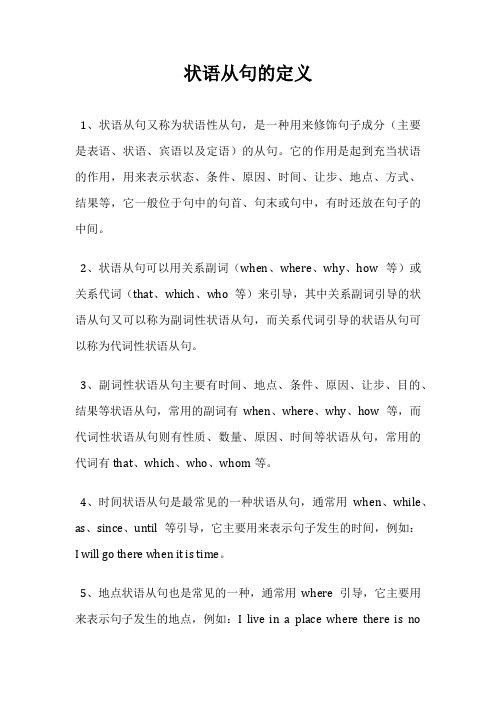状语从句
状语从句(完整版)

While there is life there is hope. (while = __a_s_l_o_n_g_a_s_ )
状语时用来修饰 动 词, 形容 词, 副 词或 句子 的一种句子成分。它可以表示时间、地点、 原因、目的、结果、条件、让步、比较、方式等。 当充当状语的部分是一个句子时,也就是状语从
句。分类如下:
状语从句
1. 时间状语从句 2. 地点状语从句 3. 原因状语从句 4. 条件状语从句 5. 让步状语从句 6. 目的状语从句 7. 结果状语从句 8. 方式状语从句 9. 比较状语从句
I had no sooner begun to talk than he rang off. No sooner had I begun to talk than he rang off. 我还未来得及讲话,他就挂断了电话。
1. I was so familiar with him that I recognized his voice
考点:名词短语引导时间状语从句
• 1. When every time I was in trouble, he would come to help me.
• 2. At next time you come, do remember bring your son here.
• 3. For the first time I met the girl. I felt in love with her.
c.f. He might be ill, for he didn’t come to
状语从句语法点

状语从句一、状语从句的定义、功能、分类定义:在复合句中作状语的从句。
功能:状语从句在主从复合句中修饰主句中的动词,形容词或副词,或整个主句。
若去掉状语,句子从语义和语法上都是一个完整的句子,状语从句是一个句子作状语,同理,去掉状语从句的主句从语义和语法上都是一个完整的句子。
分类:按意义可分为时间、地点、原因、目的、结果、条件、方式、比较、让步等状语从句。
位置:从句的位置放在句首,也可放在句末。
放在句首时,从句后面常用一个逗号,放在句末时,从句前一般不用逗号。
二、九种常见状语从句用法(一)时间状语从句引导时间状语从句的从属连词1)基本类:before、after、when、while、as、since、till、until、once、as soon as, etc.2)名词类:the moment ,the minute, the second, the instant, etc. (一…就…); every time, each time, next time, the last time, the first time, by the time, the day, the year, the morning, etc.3)副词类:immediately, directly, instantly, etc. (一...就...)4)句型类:no sooner…than…, hardly/scarcely…when…, etc. (一…就…)例句:Tell him I need to see him the minute he arrives. 他一到就告诉他我要见他。
The children ran away from the orchard(果园) the moment they saw the guard.The moment he saw me, he ran away. 他一看见我,就跑了。
状语从句

8.由as long as和so long as 引导的时间状语从句。这两个连词表示 “有多久……就多久”,通常译为“只 要”。 你可以随意到哪里去,只要在天黑以前回 来就行。 You can go where you like as long as you get back before dark. I will fight against these conditions as long as there is a breath in my body! 只要我一息尚存,我就要反对这种境况。
7.由each time, every time和whenever Each time he came to Harbin, he would call on me. 他每次来哈尔滨,总是来看我。 Whenever that man says“To tell the truth”, I suspect that he's about to tell a lie. 每当那个人说“说实在话”的时候,我猜想 他就要说谎了。 You grow younger every time I see you. 每次遇到你,见你更年轻了。
I worked until he came back. 我工作到他回来为止。 I didn't work until he came back. 他回来我这才开始工作。
4.由since引导的时间状语从句。 since引导的从句的谓语动词可以是延续性 的动词,又可以是瞬时动词。一般情况下, 从句谓语动词用一般过去时,而主句的谓 语动词用现在完成时。但在It is +时间+ since从句的句型中,主句多用一般现在时。 自从你离开以来,我一直在北京了。 I have been in Beijing since you left. 我妹妹不在北京住有四年了。 It is four years since my sister lived in Beijing.
八种状语从句

八种状语从句状语从句在句中作状语,修饰主句中的动词、形容词和副词等。
按其作用和意义可分为时间、原因、目的、结果、条件、让步、方式、比较八种。
下面对这八种从句的要点加以总结。
一、各类状语从句的引导词及易混词的区别。
1. 时间状语从句1) 引导词(1)表示“当……时候”:when, while, as, whenever(2)表示“一……就……”:as soon as(3)其它:after, before, since, until, by the timeWhenever he comes, he brings a friend. 他每次来都带个朋友。
I want to see him as soon as he arrives. 他一来我就要见他。
I went to bed after I finished my homework. 我做完家庭作业之后才睡觉。
2) 易混引导词when, while, as 的区别when既可指“时间点”,与瞬时动词连用,也可指“时间段”,与延续性动词连用(这时可与while互换)。
如:When he came in, his mother was cooking. 他进来时,他妈妈正在烧饭。
When(While)we were at school, we went to the library every day. 我们在校求学时,每天都到图书馆去。
while 只表示时间段,因此while从句的谓语动词要用延续性动词。
Please don' t talk so loud while others are talking. 别人在工作时,切勿大声讲话。
as 与when 用法相似,但着重强调主句动作与从句动作同时发生,有“随着……”或“一边……一边……”之意。
She sang as she went along. 她边走边唱。
As you get older, you get more knowledge.随着年龄的增长,你获得的知识就越多。
状语从句的特殊用法大全

状语从句的特殊用法大全1. 条件状语从句条件状语从句用于表示条件,常与if、unless等连词一起使用。
在条件状语从句中,可以使用一般现在时或一般将来时表示将来的条件,也可以使用虚拟语气表示与事实相反的条件。
例如:If you study hard, you will pass the exam.(如果你努力学习,你会通过考试的。
)If I were you, I would choose a different career.(如果我是你,我会选择一个不同的职业。
)2. 目的状语从句目的状语从句用于表示目的,常与so that、in order that等连词一起使用。
在目的状语从句中,可以使用情态动词may、can、will等表示可能性或意愿。
例如:She studied hard so that she could get a good job.(她努力学习是为了找到一份好工作。
)3. 结果状语从句结果状语从句用于表示结果,常与so、such等连词一起使用。
在结果状语从句中,可以使用so、such等词修饰形容词或副词,表示结果的程度。
例如:He was so excited that he couldn't sleep.(他太激动了,以至于无法入睡。
)4. 地点状语从句地点状语从句用于表示地点,常与where、wherever等连词一起使用。
在地点状语从句中,可以使用陈述句或虚拟语气,表示具体地点或可能性。
例如:Go where you want to go.(去你想去的地方。
)5. 时间状语从句时间状语从句用于表示时间,常与when、whenever等连词一起使用。
在时间状语从句中,可以使用一般现在时、一般过去时、将来时等表示具体时间或时间顺序。
例如:When you are ready, we can start.(当你准备好了,我们就可以开始。
)6. 让步状语从句让步状语从句用于表示尽管有困难或反对,但仍然坚持做某事。
状语从句

状语从句一.状语从句的定义:在复合句中由从句表示的状语称作状语从句,状语从句一般分为九大类:时间状语从句地点状语从句原因状语从句目的状语从句结果状语从句条件状语从句方式状语从句比较状语从句让步状语从句1.时间状语从句:在时间状语从句中,要注意时态一致,一般情况下主句是将来时的时候,从句要用一般现在时。
可以引导时间状语从句的连词很多,根据意义和主从句之间的时间关系,又可分类如下:(1)表示同时性,即主从句的谓语动作同时发生或几乎同时发生。
其连词有:when (当……的时候), while(当……的时候), as(当……的时候), once (一旦……)as soon as(一……就……), the time(当……的时刻), the moment(当……的时刻),by the time(到……时候为止), next time(下次), the first time(第一次……的时候), the last time(上次……的时候),immediately(一……就……), instantly(一……就……),directly (一……就……)以下关联词引起的句子中,前面常用过去完成时,后面用一般过去时hardly /scarcely…when…(刚……就……), no sooner…than…(刚……就……)(2)表示先时或后时,即主句的谓语动作发生在从句之前或之后。
主要连词有:after(在……之后,before(在……之前), when(=after)等。
如:After / When the children had gone to bed, she began to prepare her lessons.孩子睡觉了以后她开始备课。
(从句的动作发生在主句的动作之前,所以从句用了过去完成时)He had learned English for three years before he went to London. 他去伦敦之前已学了三年英语。
高考英语语法复习:八种状语从句的用法

高考英语语法复习:八种状语从句的用法状语从句状语从句有时间、地点、原因、目的、方式、结果、条件、让步等八种。
一、时间状语从句:引导词有after,before,as,once,since,till,until,when,whenever,while,as soon as,the moment/minute…(一…就),the time,the day,every time,next time,each time,by the time of,no sooner…than(一…就),hardly…when(一…就).例如:Each/Every time he comes here,he will drop in on me.每次他来这儿他都顺便看我.He was ill last time I saw him.上次我见到他时他病了.No sooner had she heard the news than she cried.她一听到这个消息就哭了.[辨析]when与whilewhen引导的从句动词可以是延续性的或短暂性的,while引导的从句中动词必须是延续性的;在“be…when…”句式中when表“at that time(就在这时)”意,这样用的when不能换为while;while有时并不表示时间,而表示对比,意“而”、“却”,when无这样的用法。
例如:When I got home I found the door locked./While(或When)we were working in the fields,it suddenly began to rain./He was wandering through the streets when a bike hit him./His pencil is red,while mine is yellow.[辨析]till与until一般情况下可以互换,但until可以位于句首,till则不能。
状语从句的定义

状语从句的定义1、状语从句又称为状语性从句,是一种用来修饰句子成分(主要是表语、状语、宾语以及定语)的从句。
它的作用是起到充当状语的作用,用来表示状态、条件、原因、时间、让步、地点、方式、结果等,它一般位于句中的句首、句末或句中,有时还放在句子的中间。
2、状语从句可以用关系副词(when、where、why、how等)或关系代词(that、which、who等)来引导,其中关系副词引导的状语从句又可以称为副词性状语从句,而关系代词引导的状语从句可以称为代词性状语从句。
3、副词性状语从句主要有时间、地点、条件、原因、让步、目的、结果等状语从句,常用的副词有when、where、why、how等,而代词性状语从句则有性质、数量、原因、时间等状语从句,常用的代词有that、which、who、whom等。
4、时间状语从句是最常见的一种状语从句,通常用when、while、as、since、until等引导,它主要用来表示句子发生的时间,例如:I will go there when it is time。
5、地点状语从句也是常见的一种,通常用where引导,它主要用来表示句子发生的地点,例如:I live in a place where there is nopollution.6、条件状语从句是一种用来表示条件的状语从句,通常用if或unless引导,例如:I will go there if it is time。
7、原因状语从句是一种表示原因的状语从句,通常用because或since引导,例如:I'm late because I missed the bus.8、让步状语从句是一种表示让步关系的状语从句,通常用though、although、even though等引导,例如:Although it is late, I'm still going there.9、目的状语从句是一种表示目的的状语从句,通常用so that引导,例如:I will go to bed early tonight so that I can get up early tomorrow.10、结果状语从句是一种表示结果的状语从句,通常用so…that或such…that引导,例如:I was so tired that I fell asleep at once.。
- 1、下载文档前请自行甄别文档内容的完整性,平台不提供额外的编辑、内容补充、找答案等附加服务。
- 2、"仅部分预览"的文档,不可在线预览部分如存在完整性等问题,可反馈申请退款(可完整预览的文档不适用该条件!)。
- 3、如文档侵犯您的权益,请联系客服反馈,我们会尽快为您处理(人工客服工作时间:9:00-18:30)。
状语从句基本用法及考点链接这些题你会做吗?英译汉∙ 1. It wasn’t until I attended a diversity workshop that I realized the person we passed over was the perfect person. (2009.06阅读)∙ 2. She was puzzled and somewhat disappointed because she liked the individual otherwise. (2009.06阅读)∙ 3. Although some magazines will maintain national audiences, a large number of magazines will entertain narrower audiences. (2008.06 阅读)∙ 4. The inconvenient truth is that if we don't solve the engineering problem, we're helpless. (2008.06 阅读)∙答案解析∙l. 本题包含not until引导的时间状语从句。
译文:直到我参加了多元化学习班,我才意识到被我们否决掉的那个人才是最合适的。
∙ 2. 本题包含原因状语从句,由because引导,otherwise在这里意为"除此之外"。
译文:她感到困惑,有点失望,因为除了这点之外,她还是很看好这个人的。
∙ 3. 本题包含although引导的让步状语从句。
译文:尽管一些杂志的读者遍布全国,但是还是有许多杂志会针对一些特定的读者群。
∙ 4. 本题包含if引导的条件状语从句。
译文,这个难以忽视的真相是,如果现在不能解决这个工程技术问题,我们将对此束手无策。
(一)状语从句基本用法∙什么是状语从句?∙状语从句是在复合句中充当状语的完整句子。
∙状语从句根据其作用不同,可以分为九种,时间状语从句、地点状语从句、条件状语从句、原因状语从句、目的状语从句、结果状语从句、让步状语从句、比较状语从句和方式状语从句。
例如:∙They had such a fierce dog that no one dared to go near their house. 他们有一条如此凶猛的狗,以致没人敢靠近他们家。
(结果状语从句)∙I know how to light a camp fire because I had done it before. 因为我以前做过,所以知道怎么点燃营火。
(原因状语从句)∙However rich people are, they always seem anxious to make more money. 无论人们多么富有,他们似乎总是渴望赚到更多的钱。
(让步状语从句)∙Even if he should find out he won't do anything about it. 即便他发现了,他也不会采取什么行动的。
(让步状语从句)∙I would resign rather than accept him as a partner. 我宁可辞职,也不愿∙∙一、时间状语从句∙ 1. 连词引导时间状语从句∙时间状语从句常用的连词有:when, whenever, while, as, every time, each time before,after,Since,till/Until,as soon as,the moment/minute/second/instant (一… …就), hardly…when/no sooner…than (刚… … 就)等。
例如:∙When I came home, I met an old schoolmate of mine.我回家的时候遇到了一位老同学。
∙I will write to you as soon as I have arrived home.我一回家就给你写信。
∙ 2. 副词引导时间状语从句∙可以引导时间状语从句的副词有:instantly, directly, immediately 等,其意义相当于 as soon as。
例如:∙I went to his house instantly I heard his news. 一听到这个消息,我就去他家了。
∙ 3. 词组引导时间状语从句∙可以引导时间状语从句的词组有:the moment, the instant, the first time, next time, every time等。
例如:∙The moment I received your phone call, I drove home quickly. 我一接到你的电话,马上就开车回家了。
∙You look great every time I met you. 我每次见到你,你的状态都好极了。
∙Every time I listen to your advice, I get into trouble. 每次我听了你的建议,都会惹上麻烦。
∙The children ran away from the orchard (果园) the moment they saw the guard.孩子们一看到管理员,就都跑出了果园。
∙∙二、地点状语从句∙地点状语从句通常由where, wherever, anywhere, everywhere 等连词引导。
可放在句首或句尾,位于句首时需要用逗号与主句隔开。
例如:∙Generally speaking, air will be heavily polluted where there are factories.一般来说,有工厂的地方都会有严重的空气污染。
∙Wherever you go, you should work hard. 不管你去哪里,都应该努力工作。
∙∙三、条件状语从句∙条件状语从句用来说明动作是在什么情况或条件下发生的,常用引导词有:if, unless, as/so long as, only if, providing/provided that, supposing that, in case that, on condition that等。
例如:∙We'll start our meeting if they can not come here in ten minutes. 如果他们十分钟内还不来的话,我们就开始开会。
∙Provided that there is no opposition , we shall hold the meeting here.如果没有人反对,我们就在这里开会。
∙∙四、原因状语从句∙原因状语从句用来说明动作发生的原因,常用引导词有:because, since, as, for,特殊引导词有:seeing that, now that, in that, considering that, given that 等。
例如:∙My friends dislike me because I'm handsome and successful. 我的朋友们都不喜欢我,因为我长得帅,而且事业很成功。
∙The higher income tax is harmful in that it may discourage people from trying to earn more. 高额的所得税是有害的,因为这会打消人们多赚钱的念头。
∙Considering that he is no more than 12 years old , his height of 1.80 m is quite remarkable.考虑到他才12岁,一米八零的身高已经很不平常了。
∙∙五、目的状语从句∙目的状语从句表示动作发出的目的,常用引导词有:so that, in order that;特殊引导词有:lest, in case, for fear that, in the hope that, for the purpose that, to the end that。
例如:∙The boss asked the secretary to hurry up with the letters so that he could sign them. 老板要求秘书快点儿把信准备好,他好签字。
∙The teacher raised his voice for the purpose that the students in the back could hear more clearly. 老师提高了声音,以便坐在后排的学生能听得更清楚。
∙∙六、结果状语从句∙结果状语从句表示动作带来的结果,常用引导词有:so…that, such…that, 特殊引导词有:such that, to the degree that, to the extent that , to such a degree that。
例如:∙The time is so limited that nobody can finish the task with it. 工期太紧了,以至没有人能在期限内完成这项任务。
∙To such a degree was he excited that he couldn’t sleep last night. 他太激动了,以至于昨天晚上都没睡着。
∙∙七、让步状语从句∙让步状语从句常用的引导词有:though,although, even if, even though, as(用在让步状语从句中必须要倒装),while (一般用在句首),no matter... ,in spite of the fact that,while,whatever,whoever,wherever,whenever, however, whichever 等。
例如:∙Patient as he was, he had no intention of waiting for three hours. 哪怕他再有耐心,也不打算等上三个小时。
∙The old man always enjoys swimming even though the weather is rough. 就算天气不好,这位老人也要去游泳。
提示:though 和although在引导让步状语从句时常可换用,但although 从句一般位于句首,而though 从句可以位于句首或句尾。
